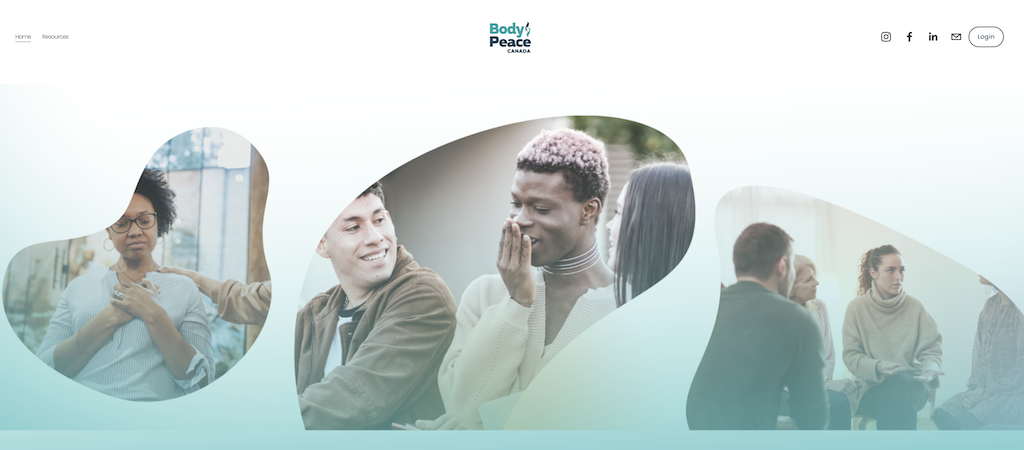Eating disorders in Canada stand as the third most common mental health condition, yet they remain among the most misunderstood within our society. This realm is fraught with stereotypes, mischaracterizations, and a pervasive lack of awareness. This often leaves those affected in the shadows of confusion and isolation. However, there’s a beacon of hope emerging on the horizon with Body Peace Canada. This pioneering initiative offers a FREE online program accessible to anyone in Canada aged 14 and over. With Body Peace Canada, barriers such as the need for a diagnosis, referrals, and the daunting waitlists are eliminated, ensuring that no one has to navigate the path to recovery alone.
Unpacking Common Myths
If you’re of a certain ahem age, you probably remember rushing home to view after-school specials featuring young white girls from affluent families struggling with bulimia and anorexia. The damage these narratives caused still lingers decades later, painting a picture that’s far from the comprehensive reality of eating disorders. The truth is, eating disorders do not discriminate.
This misconception has long overshadowed the complex nature of eating disorders, leading many to believe that they are conditions exclusive to a certain demographic. However, as Shaleen Jones from Body Peace Canada emphasized in a recent podcast, eating disorders are the third most common mental illness, affecting individuals across all genders, ages, and socioeconomic backgrounds. The stereotype of eating disorders being confined to young, affluent white girls is not only outdated but dangerously narrow, overlooking the vast array of individuals who suffer in silence.

Recent statistics reveal a startling 416% increase in eating disorder hospitalizations among boys over 17 years of age, challenging the traditional image and underscoring the urgent need for a more inclusive understanding. This rise is indicative of a broader societal issue, where the pressures of body image and diet culture permeate every corner of our lives, irrespective of gender.
Moreover, the criteria for diagnosing eating disorders have evolved, moving away from narrow definitions that excluded vast groups of people. The change in diagnostic criteria reflects a growing acknowledgment of the diversity of eating disorder experiences, allowing for more accurate recognition and support for those affected. Body Peace Canada stands at the forefront of this change, offering a beacon of hope and a path to recovery for anyone touched by eating disorders, free from the constraints of outdated stereotypes.
Facing the Realities: Understanding the Impact
The stark reality of eating disorders extends far beyond the narrow portrayals of the past, touching lives in ways many of us can scarcely imagine. These conditions are not mere phases or choices but serious mental health challenges that carry profound physical and emotional consequences. The complexity and severity of these disorders demand a deeper understanding and recognition, far removed from the simplistic and stereotypical images that have long dominated public perception.

Eating disorders are insidious, weaving their way into the fabric of individuals’ lives, often in silence and secrecy. The impact is not limited to the person suffering but ripples out to families, friends, and communities, leaving a trail of pain and confusion. The pandemic has only exacerbated these challenges, with isolation and heightened anxiety leading to a significant surge in cases. Hospitalizations soared, and the already strained support systems found themselves overwhelmed, underscoring the critical need for accessible and immediate resources like those offered by Body Peace Canada. In this digital age, where the pressures of social media and the relentless pursuit of an unattainable ideal body image are omnipresent, the battle against eating disorders is more complex than ever. Yet, it’s within this complexity that Body Peace Canada finds its strength, offering a lifeline to those navigating the tumultuous waters of recovery.
A Beacon of Hope: Envisioning a Future Free from Eating Disorders
What I was most pleased to pull from my discussion with Shaleen was that, while the path out is challenging, it’s not a lifetime sentence. It’s not just hopeful, it’s possible. This revelation stands as a powerful testament to the resilience of the human spirit and the effectiveness of dedicated support systems like those provided by Body Peace Canada. The journey towards recovery from an eating disorder is indeed fraught with challenges, and there’s no point sugar coating it, but it is also paved with moments of triumph and possibility.

Shaleen’s own journey and the stories of countless others who have navigated the treacherous waters of eating disorders serve as a beacon of hope for those still struggling. Recovery, as Shaleen notes, is not a linear process; it’s a series of steps, some forward and some back, but always with the horizon of a healthier, happier life in view. Body Peace Canada embodies this hope, offering a community and resources that reassure individuals that they are not alone, that their struggles are valid, and that recovery is within their reach. The message is clear: freedom from the clutches of an eating disorder is not just a distant dream; it’s an attainable reality with the right support and determination.
The Pivotal Role of Body Peace Canada in Eating Disorder Recovery
The ethos of Body Peace Canada is rooted in the belief that recovery is not a solitary journey. Their programs foster a sense of community, allowing individuals to connect with peers who have walked similar paths and emerged stronger. This peer support model is not just about sharing experiences; it’s about building a network of empathy, encouragement, and empowerment, reinforcing the idea that no one has to face their struggles alone.

If you or someone you love is navigating the challenges of an eating disorder, remember, you’re not alone. Body Peace Canada extends its support nationwide, offering an online community where empathy, encouragement, and empowerment thrive. This is your invitation to join a network that understands, to find strength in shared journeys, and to take that first step towards healing. Reach out, connect, and let the journey of recovery begin with the support of a community that spans coast to coast.